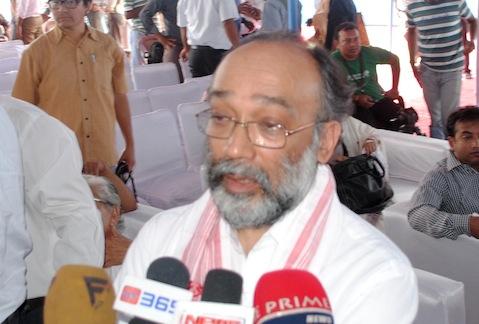Over the past years, the reduction of armed insurgency in the North-eastern states and the growth of dialogue between the State and anti-State actors is a visible change for the better, it appears. But this trend has not led to peace as many had hoped. Instead there is a disturbing increase in ethnic fracturing, mobilization and divisions, most recently seen in the demand for Inner Line Permits in Meghalaya which would require all 'outsiders' or non-tribals who wish to visit the state, once a tourist destination, to get a written 'permit' to travel; this is undercut by demands of the Garo tribe of that small state for a separate state (they say they want to move out of the control of the dominant group, the Khasis). There have been the bitter Bodo-Muslim clashes last year in Assam and the state continues to walk on an edge that combines fear, hope and despair.
Over the years, though, the Indian State has blundered its way through the complex social weaves of the region, trying to understand it and despite good intentions, succeeding in continuing to alienate large sections. For decades, conflicts and confrontations have been 'normal' living in these areas with acute tragedies and bloodshed, though this appears to be abating in one dimension. As a researcher, writer and documenter who has travelled intensively and extensively across the north-east region of India (NER) and its neighbouring countries, Mr. Hazarika, has looked at the workings of the Government, of those opposed to it, the impact of laws that endow security forces and the State with sweeping powers that can take away the right to life and liberty in an instant.
But there are other troubling aspects which are little studied or known: research, extensive field interviews, analysis of existing economic and social data show also that the State and its instruments, as well as those who claim to oppose them, have pauperized and systematically diminished the lives of those who are the most vulnerable and the poorest. Facts tell us that poverty levels in a number of parts of the ER have actually grown in the past decades, not fallen; that MMR (Maternal Mortality Ratio) levels in Assam are the worst in India; that Assam has two districts of five nationwide that report the worst Child Mortality Rates and that parts of the region can be compared to least developed countries like Cambodia and Laos.
Impunity has bred Inequality; discriminatory approaches and failure to deliver both basic services and the rule of law, to heal gaping wounds, have increased both a general sense of as well as the specific growth of Injustice. These three factors -- Impunity, Inequality and Injustice -- taken together and separately, as well as their extensive, cross-sectoral impact tell us that without an end to arbitrariness and draconian laws, without greater openness and democracy and the ability to deliver services without hindrance of bandhs, security operations and pressure tactics - all of which violate the rights of those in whose name both the State, and those who are opposed to it, speak, things can only get worse. In his talk, Mr. Hazarika proposes to look at these cross connections for we live at a time when draconian laws have created different classes of citizenship and citizenry
Sanjoy Hazarika is Director, Centre for North East Studies and Policy Research, Jamia Millia Islamia, New Delhi and in addition, holds the Dr. Saifuddin Kitchlew Chair in Jamia Millia Islamia, New Delhi. Author of three major books on the NER – Stranger of the Mist, Rites of Passage and Writing on the Wall, he was a reporter for the New York Times, Consulting Editor of The Statesman and is a widely published columnist. He also is a documentary film maker and is Managing Trustee of CNES in NER which has pioneered Boat Clinics in Assam. He is Trustee, National Book Trust of India, New Delhi; Member, Advisory Council, North East Studies Programme, JNU; Member, Indian Institute of Advanced Studies Society , IIAS Shimla; Member Executive Council, Nagaland University; Member Executive Council IIM Shillong; Chairman, Task Force, Ministry of HRD; Chairman, Governing Board, Society for Environmental Communications (Down to Earth); Member, Executive Board, Commonwealth Human Rights Initiative; Member, University Court, North Eastern Hill University, NEHU Shillong; Member, Executive Council, North Eastern Hill University, NEHU Shillong.
Azim Premji University has a clear social purpose – of working towards a just, equitable, humane and sustainable society. The University is committed towards developing outstanding professionals for the education and development sectors in India, conducting contextually relevant research in these fields and strengthening the capacities of existing professionals through high quality continuing education programmes.
---
Impunity, Inequality and the State - Looking at and through Armed Forces Special Powers Act (AFSPA)
By Prof. Sanjoy Hazarika Director, Centre for North East Studies and Policy Research, Jamia Millia Islamia, New Delhi on October 4, 2013, at The Energy and Research Institute (TERI), Bangalore
Venue: The Energy and Research Institute (TERI), Domlur II Stage, Domlur, Bangalore, Karnataka (Click here for Google Maps Link )
Date: Friday, October 4, 2013 Time: 6.00 PM to 7 PM followed by Q&A
Enquiries: events@apu.edu.in




Add new comment